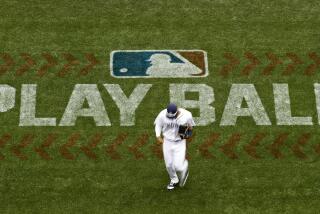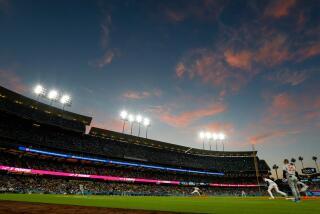Sleepy baseball players take a hit in batting average, study finds
- Share via
What makes baseball players like Jose Reyes of the New York Mets and Adrian Gonzalez of the Boston Red Sox such good hitters? It might have something to do with the time of day (or night) when the umpire yells, “Play ball!”
You see, professional ballplayers are just like the rest of us – some of them are morning people and some of them are night owls. And as anyone who has ever had to drag himself to a 7 a.m. breakfast meeting after staying up to catch the end of “The Colbert Report” knows, it’s hard to perform your best when your work hours are in conflict with your natural sleep cycle.
Now Dr. W. Christopher Winter of the Martha Jefferson Hospital Sleep Medicine Center in Charlottesville, Va., has quantified this effect in baseball players. He asked 16 players from seven teams – including the Dodgers, the Angels and the San Francisco Giants – to fill out a form called the Morningness-Eveningness Questionnaire (MEQ for short) and then matched their responses to the batting stats accumulated in the 2009 and 2010 seasons.
Games were divided into three categories for the purposes of the study: those that began before 2 p.m., those that began between 2 p.m. and 7:59 p.m., and those that began after 8 p.m. But the start times weren’t necessarily the ones printed on the ticket – they were adjusted to account for the jet lag that players experience as they travel from Seattle’s Safeco Field to Camden Yards in Baltimore. Altogether, Winter tallied 2,149 innings of “early” games, 4,550 innings played during “midday” and 750 “night” innings.
Not surprisingly, the morning players did better (as measured by combined batting average) than their night owl counterparts in day games, outbatting them by a margin of .267 to .259, Winter found. The opposite was true for night games – the night owls outbatted the morning types, .306 to .252. For the midday games, the night owls had the edge, with a combined batting average of .261 versus .252 for the morning players.
Winter, who presented the results Monday at Sleep 2011, the annual meeting of the Associated Professional Sleep Societies, said his findings could revolutionize the way managers consider their lineups.
“Currently, selecting a player for a game situation usually involves factors such as handedness, rest and possibly previous success against a certain team,” he said in a news release from the American Academy of Sleep Medicine. “Now the time of day in which the game is occurring and a player’s chronotype might be a wise factor to take into account.”
At last year’s Sleep meeting, Winter reported that pitchers who were morning people pitched better in games that began before 7 p.m., while the opposite was true for pitchers who prefer to stay up late.
More to Read
Go beyond the scoreboard
Get the latest on L.A.'s teams in the daily Sports Report newsletter.
You may occasionally receive promotional content from the Los Angeles Times.











